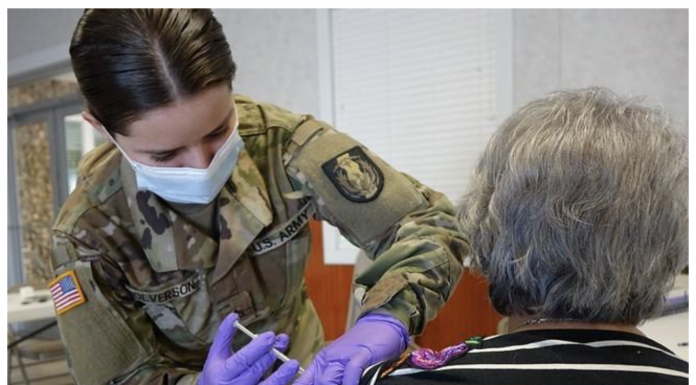FACT: COVID-19 vaccines can cause a short fever, headache, fatigue, sore arm or chills, especially after the second dose. Other reactions are extremely rare.
Myths and fears: Some people have seen claims that large numbers of people are getting seriously ill from the vaccine, that the risks of the vaccine aren’t being reported, or that officials know there are long-term risks but are keeping them secret.
The bottom line: Tens of thousands of people have received the vaccines in clinical trials, and every day thousands more are getting it, now that the first two vaccines are approved. They are all being asked to track and report any symptoms they experience.
Just as with other vaccines, the COVID-19 vaccines can cause temporary effects soon after they enter the body and start teaching the immune system to go after the coronavirus.
The most common reactions are headaches, arm pain, body aches, chills or fever lasting a few hours to a few days. Taking an over-the-counter painkiller can help ease these.
Health authorities have also reported a few cases of severe allergic reactions or a face-nerve condition called Bell’s palsy among the hundreds of thousands of people vaccinated so far. These were extremely rare, but they have received a lot of attention.
More detail: Why these temporary effects happen: Vaccines work by getting the immune system to fight. So it is common for highly effective vaccines, like the tetanus shot, to give people some symptoms.
This is a sign the vaccine is doing what it was meant to do: Wake up the immune system and prepare it to fight off an infection in the future. The COVID-19 vaccines tend to cause these same sorts of symptoms: Soreness in the muscle where the shot went in, some fatigue, and perhaps feverish.
All of these symptoms are good news because they indicate the vaccine is working. And all can be made better with common over-the-counter painkillers like acetaminophen (Tylenol) or ibuprofen (Advil or Motrin.)
Coincidental infections: The COVID-19 vaccines don’t contain coronavirus, so the vaccinated person can’t get COVID-19 from the vaccine. But they or someone they live with might get sick from a virus or bacteria that they picked up around the time they got vaccinated.
Coronavirus is widespread right now, so a vaccinated person may have been exposed to it in the days before they got vaccinated. If post-vaccination symptoms last more than a day or two, or if they include a cough, shortness of breath, diarrhea, or loss of taste or smell, the vaccinated person should talk to their health provider and stay home in isolation (away from others) until they can get tested for the coronavirus.
We also don’t know yet if a person who got the vaccine can still spread coronavirus if they come in contact with it. That’s why vaccinated people still need to wear masks until researchers can study this more.
The flu and common cold viruses are also circulating now, so a person could have been exposed to these before they were vaccinated, and get symptoms from one of those viruses. If so, they should stay home, get rest, drink fluids and take basic painkillers to ease their symptoms. They should seek medical attention for high fever or prolonged symptoms.
Rare but more serious issues: There have been several cases of anaphylaxis, or severe allergic reaction, among people with a history of such reactions who received the COVID-19 vaccine. Anyone who carries an Epi-Pen or has experienced an allergic reaction so serious that it made them unconscious or faint should mention this when they receive the vaccine.
Right now, people who have had a serious allergic reaction (like anaphylaxis) to anything are being asked to stay in the vaccination location for about a half an hour after receiving the vaccine, with someone trained to care for serious allergic reactions watching them.
The reports of Bell’s palsy (which affects the nerves of the face and is not the same as cerebral palsy) are being investigated. But the number of cases among vaccinated people was about what might occur naturally in the general population.
Long-term problems: No one has had the vaccine in their body for more than eight months (as of late December 2020), so the honest answer is we don’t know yet if these vaccines cause long-term problems. Only time and accurate tracking will tell for sure; scientists have to look for unusual patterns of disease in groups of vaccinated people.
That’s why everyone who gets vaccinated is being encouraged to track and report any symptoms they may feel in the short and long term, and to tell their health provider.
Health officials are already watching out for any patterns of problems that are out of the ordinary. So far, they have not seen any. But the scrutiny on these vaccines, and the fact that there are many more varieties of the COVID-19 vaccine now being tested, mean that we would have an early warning and alternatives.
Meanwhile, the threat of COVID-19 is very real right now. It is killing thousands of Americans every day, and leaving many others with lasting symptoms and disability from the disease.
TO BE CONTINUED …
(c) Michigan Medicine, Creative Commons Attribution 3.0 license.
PREVIOUSLY IN THIS SERIES:
Part I: “Corners Were Cut In Covid Vaccine Testing”: TRUE or FALSE?



